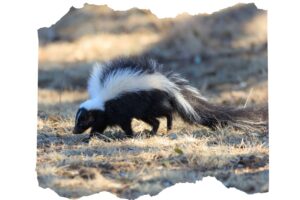
Table of Contents
Skunks Control Pest Populations
Have you ever wondered how do skunks help the environment? Read on to find and we will find out how there is more to these animals than just their smelly reputation.
Skunks are omnivores that feast on a whole range of thing such as insects, small vertebrates, fruits, berries, roots, and grasses. As opportunistic eaters, skunks help control pest populations like mice, rats, and crop-damaging insects. Their varied diet makes them Mother Nature’s clean-up crew, tidying up any leftovers they can scrounge up. Without skunks taking out the trash, we’d be knee-deep in varmints!

Skunks Improve Soil Health
Not only are skunks tiny exterminators, but they also till and aerate soil while foraging for grubs and worms. Their constant digging keeps soils healthy by allowing air and water to penetrate deeper. This accidental act of conservation facilitates decomposition and nutrient cycling. It also gives plant roots more room to spread and grow. Skunks: nature’s little gardeners!
Skunks Sustain Food Chains
As prey animals themselves, skunks are an important food source for larger predators. Hawks, owls, coyotes, and even the occasional ambitious badger may look at a skunk and think “that would make a nice meal.” When predators consume skunks, biomass and nutrients are spread through the food chain to nourish other species. Skunks thus provide a critical linkage in maintaining ecological balance.

Skunks Disperse Seeds and Fungi
Skunks further contribute to ecosystems by dispersing seeds and fungi. As messy eaters, skunks inevitably drop unwanted fruits and spread undigested seeds through their scat. This facilitates plant propagation and forest renewal. Skunks also transport beneficial fungi like mushrooms and truffles as they lumber about, further enriching soils. It seems skunks can’t help but spread life wherever their pungent aroma flows.
Skunks Contribute Character and Amusement
Beyond their functional roles, skunks offer humans less tangible, but no less important, ecological services. Their antics, like waddling about while foraging or doing elaborate handstands when threatened, never fail to entertain. And that unshakeable confidence in the face of danger is something we should all admire. Skunks add character and amusement to any landscape lucky enough to host them.
Skunks Reconnect Us to Nature
Seeing a skunk can also spark a sense of wonder about nature’s diversity. The iconic black and white coat serves as a memorable reminder of wildlife going about its business right under our noses. Skunks reconnect us to the wildness nested within suburbs and city parks. For residents and urban wildlife alike, skunks make excellent neighbors.
We Can Coexist With Skunks
Of course, that neighborly bond relies on respecting boundaries. Give skunks ample space, never corner them, and you’ll likely never experience their smelly defense. Approach with curiosity, not fear or aggression, and skunks will go about their helpful business in peace. Their unique look and behaviors tell a story of adaptation and survival. We should applaud the skunks’ tenacity, not condemn them to the role of pest.
Skunks Deserve Appreciation, Not Ridicule
In truth, skunks are some of the most benign and ecologically important creatures one could encounter. We should welcome them onto our properties and into our neighborhoods. Sure, they dance to the beat of their own drum, but skunks ultimately want the same thing we do – a safe place to call home. Keep that smell to themselves, and skunks will return the favor by keeping your yard buzzing with biodiversity.
So the next time you catch a whiff of that notorious skunky aroma drifting on the night air, remember it’s just nature’s way of telling you Mother Earth is in good hands. Within that stench lies a complex web of environmental benefits driven by one misunderstood mammal. Inhale deep and let the stink wash over you. To learn to appreciate the skunk is to open yourself to nature’s wisdom. What at first assaults your senses can become a sign of ecological wealth.
With an open mind and a nose pinched when needed, we can coexist with these ecological benefactors. Skunks neatly tidy up leftovers, cultivate healthy soil, nourish predators, and reconnect us to wildlife in our midst. They add beauty, humor, and Balance to the landscapes we share. For all they contribute, skunks deserve recognition, not ridicule. It’s time we make peace with our smelly friends and understand how “How do skunks help the environment.”
Click to watch our awesome video 10 Stinky Skunk Facts You Need to Know.
